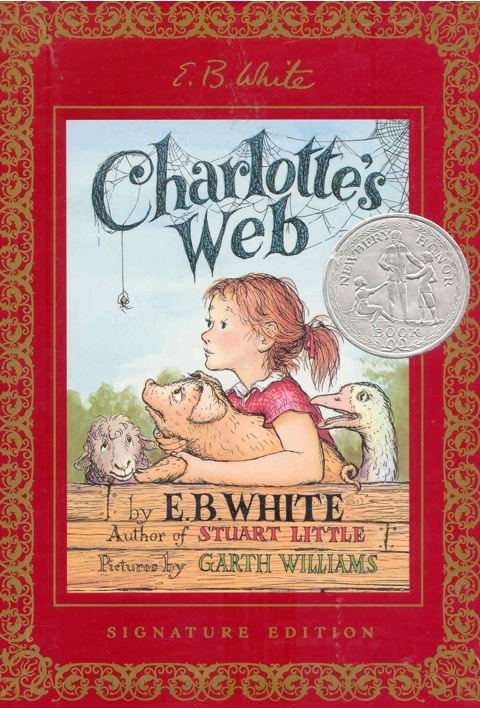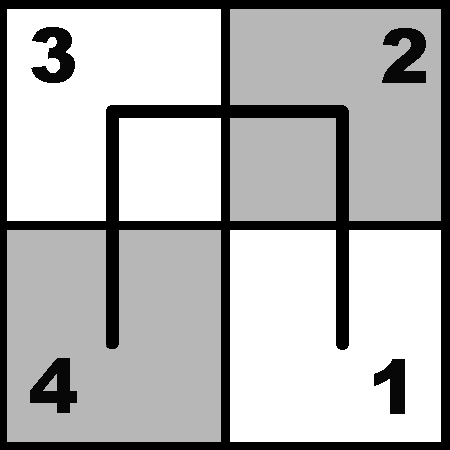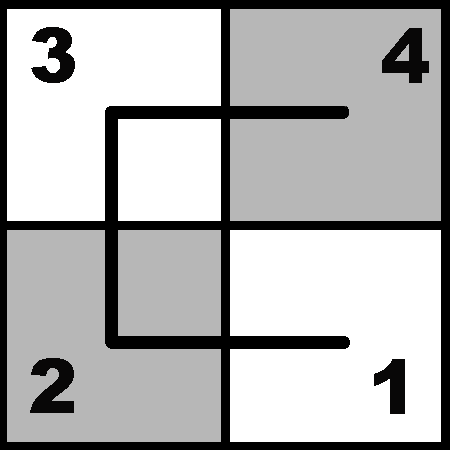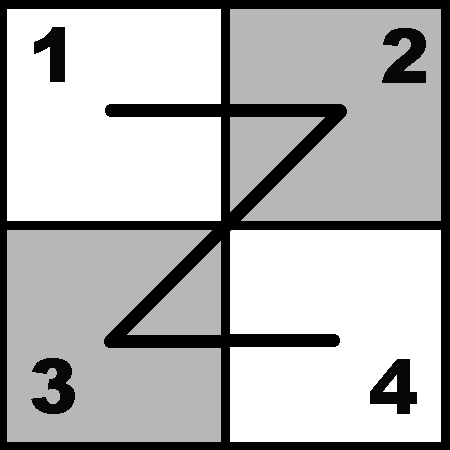Charlotte’s Web
Comprehensive Storyform
The following analysis reveals a comprehensive look at the Storyform for Charlotte’s Web. Unlike most of the analysis found here—which simply lists the unique individual story appreciations—this in-depth study details the actual encoding for each structural item. This also means it has been incorporated into the Dramatica Story Expert application itself as an easily referenced contextual example.
Story Dynamics
8 of the 12 essential questions
- Change
- Main Character Resolve
Instead of acting frenzied (as usual) when faced with a crisis, as Charlotte’s health declines, Wilbur takes charge and carries out her last wishes:
Wilbur was in a panic. He raced round and round the pen. Suddenly he had an idea-he thought of the egg sac and the five hundred and fourteen little spiders that would hatch in the spring. If Charlotte herself was unable to go home to the barn, at least he must take her children along. (White, 1952, p. 166) - Stop
- Main Character Growth
Wilbur stops acting like a helpless piglet and grows up.
- Do-er
- Main Character Approach
Wilbur tries to make friends to ease his loneliness on Zuckerman’s farm; when Charlotte informs him he is not capable of spinning a web, he still makes an attempt to perform this feat; and so forth.
- Male
- Main Character Mental Sex
Wilbur evaluates problems in terms of cause and effect; for example, when he escapes his pen, it causes an uproar.
- Decision
- Story Driver
Mr. Arable decides to spare the runt’s life and allow Fern to raise Wilbur; after Charlotte decides to help her best friend stay alive she implements a plan of action; Wilbur decides to take Charlotte’s egg sac back to the farm; and so forth.
- Timelock
- Story Limit
Mr. Zuckerman must decide that Wilbur is too valuable to live before he is to be butchered next winter, “‘almost all young pigs get murdered by the farmer as soon as the real cold weather sets in. There’s a regular conspiracy around here to kill you at Christmastime’” (White, 1952, p. 49).
- Success
- Story Outcome
Wilbur is allowed to live out his life; Mr. Zuckerman enjoys his proudest moment at the fair when Wilbur receives a medal of honor; Fern grows up and acquires a beau; Mrs. Arable stops worrying about Fern spending so much time with farm animals; Charlotte’s children are born safely; and so forth.
- Good
- Story Judgment
Wilbur’s sense of security gives him the maturity to control his actions and concentrate on helping others, instead of always thinking of himself first.
Overall Story Throughline
""SOME PIG""
- Universe
- Overall Story Throughline
As part of the cycle of life on a farm, Wilbur will ultimately be put to death.
- Future
- Overall Story Concern
The doctor is able to reassure Mrs. Arable about Fern’s future; Wilbur does not want to die, “‘I want to stay alive, right here in my comfortable manure pile with all my friends’” (White, 1952, p. 51).
The old sheep points out to Templeton why he should be concerned about Wilbur, and consequently his own future:
“Wilbur’s leftover food is your chief source of supply, Templeton. You know that. Wilbur’s food is your food; therefore Wilbur’s destiny and your destiny are closely linked. If Wilbur is killed and his trough stands empty day after day, you’ll grow so thin we can look right through your stomach and see objects on the other side.” (White, 1952, p. 90-91) - Preconception
- Overall Story Issue
Despite the miracle in the spider’s web, Mr. Zuckerman continues his plan to butcher Wilbur; Mrs. Arable informs her husband of her intent to discuss Fern with the doctor; “‘I want him to know how queerly she is acting about that pig and everything. I don’t think it’s normal. You know perfectly well animals don’t talk.’ Mr. Arable grinned. ‘Maybe our ears aren’t as sharp as Fern’s’ he said ” (White, 1952, p. 54).
Mrs. Arable fidgeted. “Fern says the animals talk to each other. Dr. Dorian, do you believe animals talk?” “I never heard one say anything,” he replied. “But that proves nothing. It is quite possible that an animal has spoken civilly to me and that I didn’t catch the remark because I wasn’t paying attention. Children pay better attention than grownups. If Fern says that the animals in Zuckerman’s barn talk, I’m quite ready to believe her.” (White, 1952, p. 110) - Openness
- Overall Story Counterpoint
- Overall Story Thematic Conflict
Preconception vs.Openness - Uncontrolled
- Overall Story Problem
Fern is out of control when she hears her father is going to kill the runt, “‘Fern,’ he said gently, ‘you will have to learn to control yourself.’ ‘Control myself,’ yelled Fern. ‘This is a matter of life and death, and you talk about controlling myself’” (White, 1952, p.2-3).
The Arable’s are unable to control Fern’s visits to the farm; mothers are worried their children will fall off Zuckerman’s swing; Wilbur creates pandemonium when he escapes from his pigpen. - Control
- Overall Story Solution
Mr. Arable allows Fern to care for the runt; Mrs. Arable’s consultation with the doctor serves to check her fears concerning Fern; no child has ever fallen of Zuckerman’s swing “children almost always hang onto things tighter than their parents think they will” (White, 1952, p. 69); Lurvy’s bucket of slops entices Wilbur back into his pen; Wilbur’s instinctive response to scream at the news of his imminent demise causes Charlotte to sharply instruct him to calm down.
- Hinder
- Overall Story Symptom
Fern thwarts her father’s act of axing the runt; Mrs. Arable suggests to Fern that she spend more time outdoors with her playmates, and less time in Uncle Homer’s barn; the barn cellar animals strive to impede Zuckerman’s plan to kill Wilbur.
- Help
- Overall Story Response
Mrs. Arable goes to the doctor for help; Charlotte calls a meeting of the barn cellar animals to enlist their help in the plan to save Wilbur; the goose suggests a new adjective to describe the pig; and the oldest sheep suggests sending Templeton to the dump to find new words.
- Openness
- Overall Story Catalyst
Mr. Arable is open to Fern’s plea of allowing the runt to live; every time there is a new word in Charlotte’s web, the Zuckerman’s re-evaluate their pig; the old sheep’s reminder to Templeton that if Wilbur were to die, he would miss out on the pig’s food scraps, forces Templeton to re-evaluate Charlotte’s request for help.
- Denial
- Overall Story Inhibitor
Fern does not accept her father’s reasons for deciding to kill the runt; Mr. Zuckerman refuses to believe the writing in the web is not a miracle, but the work of a common grey spider.
- Past
- Overall Story Benchmark
Mr. Arable allowing the runt to live, instead of doing away with it as he would in the past, serves a good omen for Wilbur’s future; from his past experience, Dr. Dorian is able to reassure Mrs. Arable that at Fern’s age, animals are more interesting than boys, and as time goes on her attention will be sure to shift from Wilbur to Henry Fussy.
- Overall Story Throughline Synopsis
Wilbur is born onto a farm where, as a matter of course, runts are immediately put to death and pigs that grow up are slaughtered for winter feasts. Wilbur is able to escape this fate with the help of Fern, the farmer’s daughter, and later Charlotte, an extraordinary spider.
Additional Overall Story Information →
Main Character Throughline
Wilbur — Fern's runt, Zuckerman's pig, Charlotte's friend
- Physics
- Main Character Throughline
Taking part in the effort to stay alive, Wilbur engages in activities that bear out the messages Charlotte weaves in her web, such as doing back flips with a half twist:
Ever since the spider had befriended him, he had done his best to live up to his reputation. When Charlotte’s web said SOME PIG, Wilbur had tried hard to look like some pig. When Charlotte’s web said TERRIFIC, Wilbur had tried to look terrific. And now that the web said RADIANT, he did everything possible to make himself glow. (White, 1952, p. 114) - Obtaining
- Main Character Concern
Wilbur is concerned with obtaining amnesty from execution.
- Self-Interest
- Main Character Issue
Throughout the story, Wilbur’s first concern is for his comfort and safety; when he realizes that Charlotte and her egg sac cannot make the journey back to the farm, he stops thinking of himself and makes arrangements to take the egg sac.
- Morality
- Main Character Counterpoint
- Main Character Thematic Conflict
Self-Interest vs.Morality - Uncontrolled
- Main Character Problem
Wilbur’s immediate response to a problem is one of frenzy (when he has escaped his pen) or hysteria (when he finds out he is to be butchered).
- Control
- Main Character Solution
The organization process that Wilbur must go through to transport Charlotte’s egg sac back to the farm, all the while maintaining his cool, is indicative of him growing up.
- Avoid
- Main Character Symptom
Wilbur is focused on avoiding death.
- Pursuit
- Main Character Response
Wilbur seeks helps from Charlotte to save his life.
- Approach
- Main Character Unique Ability
Wilbur’s sweet nature endears him to others, compelling them to want to help him stay alive.
- Obligation
- Main Character Critical Flaw
As an example of how “obligation” undermines Wilbur’s efforts, for Wilbur to fatten up into SOME PIG, he must eat every scrap in his trough, however, since Templeton was instrumental in saving Charlotte from Avery’s stick, he feels he must share his food with the rat.
- Understanding
- Main Character Benchmark
The more Wilbur appreciates his impending death, the more concerned he is with finding a way to save his life.
- Main Character Description
sweet-natured; fun-loving
- Main Character Throughline Synopsis
Wilbur is a happy-go-lucky pig faced with a certain death; although this is his concern, he learns to think of others’ problems.
Additional Main Character Information →
Influence Character Throughline
Charlotte — Spider
- Psychology
- Influence Character Throughline
Charlotte thinks of ways to fool insects for her own survival, and manipulate humans to save Wilbur:
“Why, how perfectly simple! she said to herself. The way to save Wilbur’s life is to play a trick on Zuckerman. If I can fool a bug, thought Charlotte, I can surely fool a man. People are not as smart as bugs.” (White, 1952, p. 67) - Becoming
- Influence Character Concern
Charlotte wants to become more than a spider, she is also concerned with saving the lives of her loved ones.
- Commitment
- Influence Character Issue
Charlotte has made a commitment to save Wilbur’s life, yet she also has a responsibility to save her strength for her future children.
- Responsibility
- Influence Character Counterpoint
- Influence Character Thematic Conflict
Commitment vs.Responsibility - Feeling
- Influence Character Problem
Charlotte’s feelings of affection for Wilbur drive her to save his life.
- Logic
- Influence Character Solution
Charlotte uses her logic to think of a way to save Wilbur’s life:
Having promised Wilbur that she would save his life, she was determined to keep her promise…and she felt sure that if she thought long enough about Wilbur’s problem, an idea would come to her mind. Finally, one morning toward the middle of July, the idea came. (White, 1952, p. 66-67) - Hinder
- Influence Character Symptom
Charlotte channels her efforts into making it difficult for Wilbur to be complacent about his life.
- Help
- Influence Character Response
Not only does Charlotte help Wilbur live, she helps him to emotionally grow up.
- Rationalization
- Influence Character Unique Ability
To keep Wilbur from worrying, Charlotte is able make him think she is in the process of implementing a plan to save him, when in actuality, it is not yet developed.
- Attitude
- Influence Character Critical Flaw
Charlotte does not apologize for her hard-hearted attitude toward survival:
“It’s a miserable inheritance,” said Wilbur, gloomily”...it’s cruel.” “Well, you can’t talk,” said Charlotte. “You have your meals brought to you in a pail. Nobody feeds me. I have to get my own living. I live by my wits. I have to be sharp and clever, lest I go hungry. I have to think things out, catch what I can, take what comes.” (White, 1952, pp. 39-40) - Conceptualizing
- Influence Character Benchmark
Charlotte’s visualization of the implementation of her idea to save Wilbur is the standard against which her concern of his untimely end is measured.
- Influence Character Description
Wilbur’s best friend and savior; beautiful and intelligent. “It’s not often that someone comes along who is a true friend and a good writer. Charlotte was both” (White, 1952, p. 184).
- Influence Character Throughline Synopsis
Charlotte appreciates Wilbur for who he is, and in addition to working toward saving his life, gently guides his maturation process.
More Influence Character Information →
Relationship Story Throughline
""The Writer and the Runt""
- Mind
- Relationship Story Throughline
Wilbur has the attitude that he is ordinary; Charlotte’s point of view is that he is a very special pig:
Wilbur blushed. “But I’m not terrific, Charlotte. I’m just about average for a pig.” “You’re terrific as far as I’m concerned,” replied Charlotte, sweetly, “and that’s what counts. You’re my best friend, and I think you’re sensational. Now stop arguing and go get some sleep!” (White, 1952 p. 91) - Subconscious
- Relationship Story Concern
Wilbur desires to live; Charlotte is driven to save him, “‘I don’t want to die.’ ‘...I am not going to let you die, Wilbur’” (White, 1952, p.62-63).
- Denial
- Relationship Story Issue
Charlotte and Wilbur refuse to accept the foregone conclusion that he will be butchered at Christmastime.
- Closure
- Relationship Story Counterpoint
- Relationship Story Thematic Conflict
Denial vs.Closure - Temptation
- Relationship Story Problem
Problems between Wilbur and Charlotte are created when Wilbur is tempted to depend on Charlotte to solve all his problems, instead of standing on his own hooves.
- Conscience
- Relationship Story Solution
Wilbur must follow through on certain required steps to protect the lives of Charlotte’s future children, and to ensure they will be born in the barn.
- Hinder
- Relationship Story Symptom
Charlotte must make things tough for Wilbur to help him grow up; Wilbur’s neediness makes it difficult for Charlotte to concentrate on her own problems:
“The Fair comes at a bad time for me. I shall find it inconvenient to leave home, even for a few days.” “Please come with me!” begged Wilbur. “I need you, Charlotte. I can’t stand going to the Fair without you. You’ve just got to come.” (White, 1952, p. 116) - Help
- Relationship Story Response
Charlotte and Wilbur learn to help each other through each of their difficulties.
- Closure
- Relationship Story Catalyst
Charlotte’s death ends their earthly friendship, but Wilbur’s promise to care for her children in the egg sac continues their relationship forever.
- Preconception
- Relationship Story Inhibitor
Wilbur’s discovery of how Charlotte survives impedes their new friendship, “Charlotte is fierce, brutal, scheming, bloodthirsty-everything I don’t like. How can I learn to like her, even though she is pretty and, of course, clever” (White, 1952, p. 41).
- Memory
- Relationship Story Benchmark
Wilbur’s memory of his friendship with Fern fades as she grows up and visits less often, however, long after Charlotte’s death, the spider’s and Wilbur’s friendship flourishes, nurtured by her children and grandchildren and the fond memory Wilbur holds of his dear friend, “Wilbur never forgot Charlotte. Although he loved her children and grandchildren dearly, none of the new spiders ever quite took her place in his heart” (White, 1952, p. 184).
- Relationship Story Throughline Synopsis
In the endeavor to save Wilbur’s life, Charlotte is able to help Wilbur grow up, and in turn, he is able to help her children.
Additional Relationship Story Information →
Additional Story Points
Key Structural Appreciations
- Future
- Overall Story Goal
Wilbur’s future, or lack thereof, is the goal of common concern to the objective characters.
- Subconscious
- Overall Story Consequence
If Charlotte’s plan to save Wilbur fails, he will not achieve his wish to live a long life; Templeton will not fulfill his desire to live the high life and will waste away to skin and bones; Charlotte’s desire for her children to be born at her home will be unfulfilled; Fern will be crushed; and so forth.
- Becoming
- Overall Story Cost
Charlotte becomes weak; Templeton becomes fat and bloated; the farm becomes neglected as the Zuckermans’ and Lurvy concentrate on Wilbur and his many visitors; and so forth.
- Obtaining
- Overall Story Dividend
The Zuckermans’ achieve fame; Templeton obtains more food then he could have ever dreamed; and so forth.
- Past
- Overall Story Requirements
All those in favor of Wilbur living a long life, must make sure what has happened in the past to pigs (their untimely end) does not happen to him.
- Memory
- Overall Story Prerequisites
The old sheep remembers what happens to fattened up pigs on the farm and warns Wilbur of his doom, “‘I’m an old sheep and I see the same thing, same old business, year after year’” (White, 1952, p.49).
- Conceptualizing
- Overall Story Preconditions
Charlotte must determine how her idea for saving Wilbur can be implemented; the old sheep comes up with a practical way of obtaining new words for the web; Mr. Zuckerman, et al, must imagine the words in the web are a miracle, not the work of a common grey spider.
- Understanding
- Overall Story Forewarnings
Wilbur and his friends must understand that unless drastic measures are taken, he will be served up for Christmas dinner; Charlotte understands her time to save Wilbur is limited.
Plot Progression
Dynamic Act Appreciations
Overall Story
- Present
- Overall Story Signpost 1
Fern is concerned with saving, and raising, the runt; Wilbur is concerned with his state of loneliness, the Zuckerman’s and Lurvy are concerned with keeping their pig in his pen; Templeton is concerned with himself.
- Progress
- Overall Story Signpost 2
Mrs. Arable is concerned with what she perceives as Fern’s lack of emotional growth; the oldest sheep notices Wilbur is fattening up; Wilbur is concerned with the progress of Charlotte’s plan to save him; the goose gives birth to her goslings “‘Luck had nothing to do with this, said the goose. It was good management and hard work’” (White, 1952, p. 45).
- Past
- Overall Story Signpost 3
Fern and the barn cellar animals listen to Charlotte’s “once upon a time” tale of her cousin catching a fish; everyone is affected when they hear the crickets sing a song warning summer is almost past and sadness and change are coming, for Avery and Fern it means summer is almost behind them and school will start soon, the goslings realize they will never be young again, the maple tree turns “bright red with anxiety” (White, 1952, p. 144).
- Future
- Overall Story Signpost 4
Charlotte is sad she will not live to see her five hundred and fourteen children next spring; Templeton will not help Wilbur until the pig promises him first choice of everything in his trough in the future; each spring Charlotte’s descendants hatch in the barn doorway; Fern sees her future as a young lady and stops visiting the barn as often; the Zuckermans care for Wilbur for the rest of his life.
Main Character
- Learning
- Main Character Signpost 1
Wilbur learns what the great outdoors is like outside his pen.
- Obtaining
- Main Character Signpost 2
Once Wilbur finds out he may be the main entree for Christmas dinner, he is concerned with obtaining amnesty from execution.
- Understanding
- Main Character Signpost 3
Wilbur is concerned that Zuckerman understands he is an extraordinary pig.
- Doing
- Main Character Signpost 4
Wilbur is concerned with performing for the judges and audience at the fair; he is concerned with taking Charlotte’s children home to the barn; and so forth.
Influence Character
- Being
- Influence Character Signpost 1
Charlotte is concerned with the skills necessary for a spider, “‘You mean you eat flies?’ ‘Certainly. Flies, bugs, grasshoppers…anything that is careless enough to get caught in my web. I have to live…’” (White, 1952, p.39).
- Becoming
- Influence Character Signpost 2
Charlotte is concerned with becoming more than a spider; she wishes to become Wilbur’s savior.
- Conceiving
- Influence Character Signpost 3
Charlotte needs to come up with new ideas for messages to weave in her web; Charlotte is concerned with hatching her eggs; Charlotte is concerned with conceiving a way to go to the fair with Wilbur, and taking care of her eggs at the same time.
- Conceptualizing
- Influence Character Signpost 4
Charlotte tries to envision how her egg sac can be taken back to the farm safely, so that she may die with peace of mind, knowing her children will be born at her home.
Relationship Story
- Memory
- Relationship Story Signpost 1
Wilbur’s horrible recollection of his lonely day fades when Charlotte becomes his friend.
- Preconscious
- Relationship Story Signpost 2
Wilbur’s horror of Charlotte acting on her instincts for survival fade, “Wilbur liked Charlotte better and better each day. Her campaign against insects seemed sensible and useful” (White, (1952, p.48).
- Subconscious
- Relationship Story Signpost 3
Wilbur is afraid to be without Charlotte at the fair; Charlotte is driven to create an egg sac for her children.
- Conscious
- Relationship Story Signpost 4
Once Charlotte forces Wilbur to consider the fact he cannot stay at the fair with her, he takes action to bring her egg sac safely home.
Plot Progression Visualizations
Dynamic Act Schematics
OS:  MC:
MC:  IC:
IC:  RS:
RS: 




